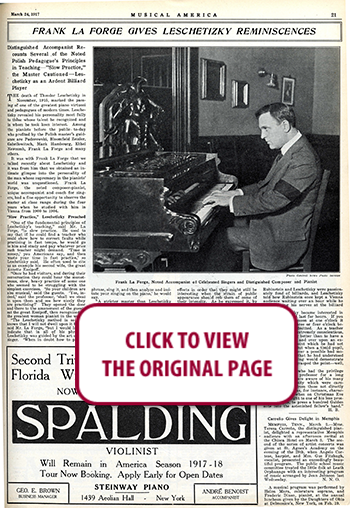 100 YEARS AGO IN MUSICAL AMERICA (188)
100 YEARS AGO IN MUSICAL AMERICA (188)
March 24, 1917
Page 21
FRANK LA FORGE GIVES LESCHETIZKY REMINISCENCES
Distinguished Accompanist Recounts Several of the Noted Polish Pedagogue’s Principles in Teaching—”Slow Practice,” the Master Cautioned—Leschetizky as an Ardent Billiard Player
THE death of Theodor Leschetizky in November, 1915, marked the passing of one of the greatest piano virtuosi and pedagogues of modern times. Leschetizky revealed his personality most fully to those whose talent he recognized and in whom he took keen interest. Among the pianists before the public to-day who profited by the Polish master’s guidance are Paderewski, Bloomfield Zeisler, Gabrilowitsch, Mark Hambourg, Ethel Newcomb, Frank La Forge and many others.
It was with Frank La Forge that we talked recently about Leschetizky and it was from him that we obtained an intimate glimpse into the personality of the man whose supremacy in the pianists’ world was unquestioned. Frank La Forge, the noted composer-pianist, unique accompanist and coach for singers, had a fine opportunity to observe the master at close range during the four years when he studied with him in Vienna from 1900 to 1904.
“Slow Practice,” Leschetizky Preached
“One of the fundamental principles of Leschetizky’s teaching,” said Mr. La Forge, “is slow practice. He used to say that if he could find a teacher who could show how to correct faults while practising in fast tempo, he would go to him and study and pay whatever price such teacher might demand. ‘Time is money,’ you Americans say, and then waste your time in fast practice,’ so Leschetizky said. He often used to cite as an example his second wife, the great Annette Essipoff.
“Once he had visitors, and during their conversation they could hear the monotonous, slow, heavy practice of someone who seemed to be struggling with the simplest exercises. ‘So your children are also musical,’ said the guests. ‘Yes, indeed,’ said the professor, ‘shall we steal in upon them and see how nicely they are practising?’ They opened the and there to the amazement of the guests sat the great Essipoff, then recognized as the greatest woman pianist in the world.
“The Leschetizky method is so well known that I will not dwell upon it here,” said Mr. La Forge, “but I would like to indicate that in all of his phrasing Leschetizky was guided by the art of the singer. ‘When in doubt how to play a phrase, sing it, and then analyze and imitate your singing on the piano,’ he would say.
“A stricter master than Leschetizky cannot be imagined. He aimed to prepare his pupils for public careers and was most exacting in his demands for a perfect performance in his studio. Knowing full well that the intensity of an interpretation is apt to pale when the player is possibly embarrassed by a critical audience or by circumstances which tend to unnerve the performer, he used to exhort us to exaggerate in some measure the effects in order that they might still be interesting when·the strain of public appearance should rob them of some of their intensity. As he expressed it, by one of the mottos of which he made such frequent use, ‘The soup is never eaten as hot as it is cooked.’
An Ardent Billiard Player
“Leschetizky was a pupil of Czerny, who in his turn was a pupil of Beethoven. He was a great friend and admirer of Rubinstein, whom he always held up as a model to his pupils. Both Rubinstein and Leschetizky were passionately fond of billiards, and Leschetizky told how Rubinstein once kept a Vienna audience waiting over an hour while he was calming his nerves at the billiard table.
“If Leschetizky became interested in a lesson, it might last for hours. If you came for your lesson at one o’clock it was sometimes three or four o’clock before you were admitted. As a teacher Leschetizky was extremely conscientious, and liked nothing better than to have a pupil insist over and over upon an explanation of a point which he had not comprehended. But when a timid pupil, in order to tide over a possible bad moment, would say that he had understood and then in playing would demonstrate that he had not grasped the point—well, that was bad!
“Those of us who had the privilege of knowing the professor for a long period of time were aware of his many deeds of generosity which were carefully concealed from those not directly concerned. It was, for instance, characteristic of him when on Christmas Eve he bade good-night to one of his less prosperous pupils, to press a hundred Gulden note into the astonished fellow’s hand.” —H. B.




 RENT A PHOTO
RENT A PHOTO





